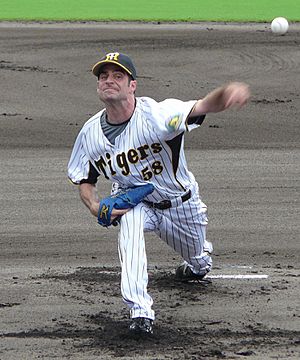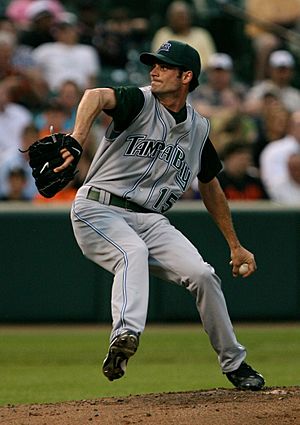Casey Fossum facts for kids
Quick facts for kids Casey Fossum |
|||
|---|---|---|---|

Fossum with the Hanshin Tigers
|
|||
| Pitcher | |||
| Born: January 6, 1978 Cherry Hill, New Jersey, U.S. |
|||
|
|||
| Professional debut | |||
| MLB: July 29, 2001, for the Boston Red Sox | |||
| NPB: April 15, 2010, for the Hanshin Tigers | |||
| Last appearance | |||
| MLB: April 26, 2009, for the New York Mets | |||
| NPB: July 4, 2010, for the Hanshin Tigers | |||
| MLB statistics | |||
| Win–loss record | 40–53 | ||
| Earned run average | 5.45 | ||
| Strikeouts | 607 | ||
| NPB statistics | |||
| Win–loss record | 2–5 | ||
| Earned run average | 5.72 | ||
| Strikeouts | 48 | ||
| Teams | |||
|
|||
Casey Paul Fossum (born January 6, 1978) is a former professional baseball pitcher. He played for several teams in Major League Baseball (MLB). These teams included the Boston Red Sox, Arizona Diamondbacks, Tampa Bay Devil Rays, Detroit Tigers, and New York Mets. He also played for the Hanshin Tigers in Japan's Nippon Professional Baseball. Casey is a left-handed pitcher and batter.
Contents
About Casey Fossum
Casey Fossum is no longer playing professional baseball. He lives in his hometown of Waco, Texas.
Casey's Early Life and College Baseball
Casey Fossum was born in Cherry Hill, New Jersey. He grew up in Waco, Texas, and went to Midway High School. In high school, he was named Central Texas Player of the Year twice. He was also a first-team all-state player in 1995 and 1996. In 1996, he had an amazing 210 strikeouts in just 105 innings.
After high school, Casey went to Texas A&M University. He was a Freshman All-American there. He still holds the school record for the most strikeouts in a single season and in a career. Casey helped the Aggies reach the 1999 College World Series. He was honored in the Big 12 conference in both 1998 and 1999. In 1999, he had 12 wins and 7 losses, with a 3.64 earned run average (ERA). That year, he set a school record with 162 strikeouts.
Casey's Major League Baseball Career
Playing for the Boston Red Sox (1999-2003)
The Boston Red Sox chose Casey Fossum in the 1999 baseball draft. He was the 48th player picked overall. Casey started his Major League Baseball career in 2001.
During his three years with the Red Sox, Casey pitched as both a starting pitcher and a relief pitcher. He won 14 games and had two saves in 75 games. In September 2003, he had surgery on his pitching shoulder. A few months later, he was traded to the Arizona Diamondbacks. This trade helped the Red Sox get another famous pitcher, Curt Schilling.
Playing for the Arizona Diamondbacks (2004)
In 2004, Casey Fossum played for the Arizona Diamondbacks. This was the first time he was only used as a starting pitcher. He missed the first five and a half weeks of the season while recovering from his surgery. Even so, he made 27 starts, pitched 142 innings, and had 117 strikeouts for the Diamondbacks.
Playing for the Tampa Bay Devil Rays (2005-2007)
Before the 2005 season, Casey was traded to the Tampa Bay Devil Rays. In 2006, he had 6 wins and 6 losses, with an ERA of 5.33 in 25 starts. The Devil Rays released Casey on August 10, 2007.
Playing for Other Teams (2007-2015)
After leaving the Devil Rays, Casey signed a minor league contract with the San Diego Padres in August 2007, but he did not play for them.
In 2008, he signed with the Detroit Tigers. He joined their main team in June of that year. In 2009, Casey signed with the New York Mets. He pitched three innings for them before being moved off the team. Later in 2009, he signed minor league contracts with the New York Yankees and the Chicago Cubs.
Casey also signed contracts with the New York Mets again in 2011 and the Baltimore Orioles in 2012. In 2015, after three years away from baseball, Casey played for the Lancaster Barnstormers. This team is part of an independent league. He made two starts for them before becoming a free agent.
Casey's Pitching Style
Casey Fossum was known for throwing three different types of curveballs. A curveball is a pitch that curves as it travels towards the batter.
- One curveball was fast and spun tightly.
- Another curveball was slower and had a moderate curve.
- His third curveball, which he called the "Fossum flip," had a very large curve. This pitch was hard for batters to hit. It was a special kind of slow pitch called an eephus pitch.
Casey also threw a good fastball that was usually between 88 and 92 miles per hour. He had a changeup pitch too, which is meant to look like a fastball but is slower. Casey was also a good fielder and was good at preventing runners from stealing bases.
Casey's main challenge was his stamina. He was a lighter player, weighing about 160 pounds. His throwing style was powerful, which sometimes led to injuries. For example, he missed time in 2004 with an elbow injury.
 | Jewel Prestage |
 | Ella Baker |
 | Fannie Lou Hamer |


